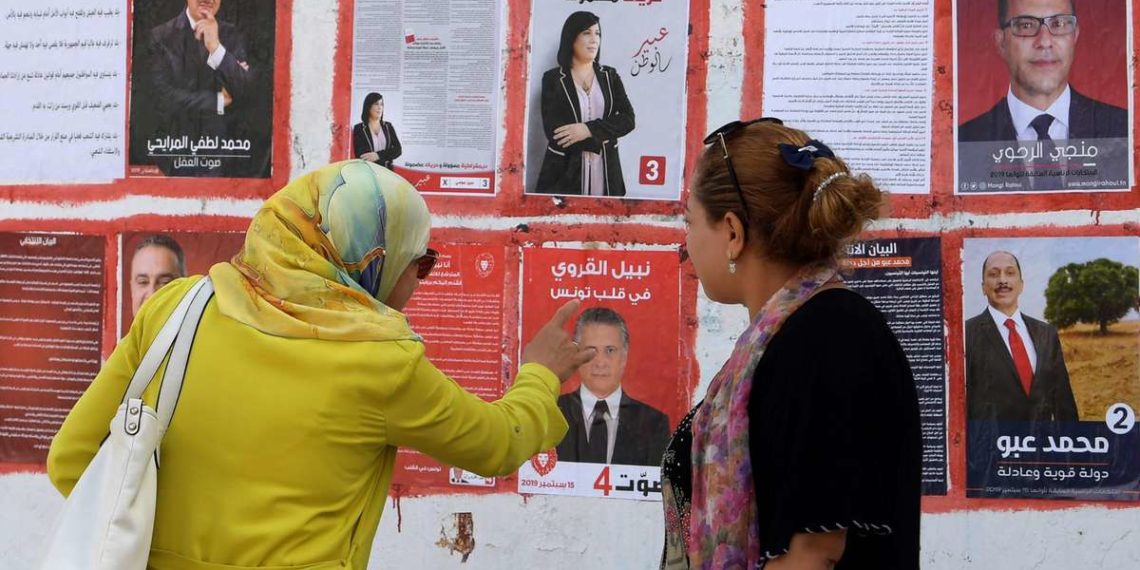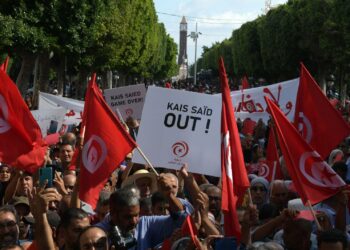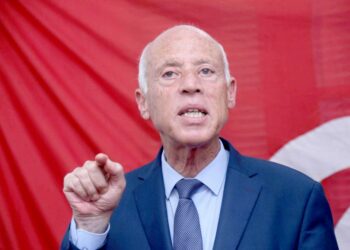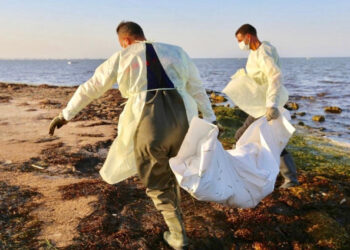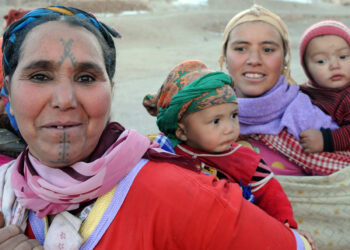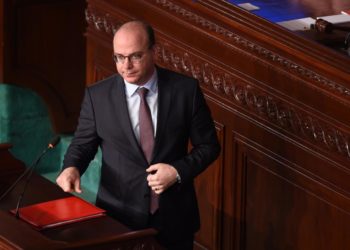Last week’s Tuesday, after a long wait in the press center of Tunisia’s electoral commission, members of the agency arrived in front of a crowd of journalists to declare the surprising results of the presidential contest. Kais Saied, an independent intellectual and professor of constitutional law, and Nabil Karoui, a wealthy TV tycoon, had become first and second. They would face each other in the second round.
The scene of the electoral commission’s press conference was a tremendous democratic spectacle, which was highly popular in the Arab and international media. There is no doubt that Tunisia represents the democratic dream of the Arab world, a place too often identified with dictators and religious fanaticism.
الدورة الثانية من الانتخابات الرئاسية 2019 🇹🇳🗳#ISIE #تونس #Tunisie #Tunisia #TnElection #TnElec #TnElec2019 #TnElec2019 #الرئاسية2019 #رئاسيات2019 #الانتخابات_التونسية pic.twitter.com/ckOWQZe1TJ
— ISIE (@ISIETN) September 17, 2019
However, the lovely picture the media presented hides a much more complex situation that deserves analyzing in order to have a better and more realistic understanding of Tunisia’s democratic process.
Tunisia’s Election
This election, the third of the post-2011 democratic era, tells us two important things. First, it represents the victory of anti-party and independent candidates. Second, the turnout was low, indicating a weak attachment to the electoral process.
The first factor has been highlighted in both media and political analyses. Seven out of the first ten candidates were either independent or have fictitious parties, built around their personality. This aspect was largely exaggerated by pointing out that the Tunisian voter wanted to punish the “system” and that this was the evidence of a populist wave that after Europe and America had now reached Tunisia.
However, this so-called “populism” is not a new phenomenon in Tunisia elections at all. For example, in the 2011 (constitutional) elections, Hachim Hamdi’s party came in third. Hamdi, very similar to runner-up Karoui today, was broadcasting for hours from a TV studio in London. He appeared alone addressing the word directly to the people, crying against the political parties, and promising easy solutions for the poor people.
The second factor, the low turnout, has been completely ignored. Taken in by a wave of “democratic enthusiasm” for the “Tunisian model,” very few pointed out that those who did participate in the democratic exercise were less than half of the electorate.
According to official statistics, Tunisia has more than 8.2 million eligible voters. In 2011, when the highest rate of participation was recorded, over 4.3 million people (54 percent of the electorate) came out to vote. In the recent elections, however, this number had dropped by 11 percent to only 3.3 million voters.
How can we explain these two trends, and how do they link to the democratic process?
Lack of Participatory Democracy
The first possible explanation is that the Tunisian revolution or, more accurately, the democratic process that followed, was unable to produce a participatory democracy. The Tunisian Revolution was possible because of the revolutionary drive of marginalized segments of society that did not find their way in the post-revolutionary context.
Between 2011 and 2013, radical Salafists were able to build a revolutionary project to channel this revolutionary sector of Tunisian society. Trapped between the state’s repressive actions and the dead-end of political violence, they progressively lost most of their legitimacy. Deprived of the ideological Islamist and revolutionary option, the frustrated and marginalized classes tried again a (non-ideological) uprising in both 2016 and 2018, following the same dynamics of protest that had succeeded in 2011.

Beginning in the west-central city of Kasserine, spontaneous revolt movements started a process that aimed to gain momentum around the social issues of unemployment and social justice. However, they did not succeed, in part because they did not have a clear political program and organization and in part because the democratic consensus of the middle classes did not support radical political options after 2013.
A good part of the population, therefore, and in particular that social segment of society that had been protagonists of the uprising of 2011, never believed in the typical politics of the democratic procedures as a way to change things. Although the first elections were more participative, since 2012 the frustration of this part of the nation was expressed in mobilization instead of participation in political parties.
Ideological Vote
The second explanation is related to the “ideological vote.” In Tunisia, as in the rest of the Arab world, there have been, since its 1956 independence, two ideological orientations: Islamist and nationalist. In 2011, in the first democratic vote, when society could really express itself without any constraint, the Islamist front won because the opposite ideological front was perceived to be linked to the old regime.
In 2014, the elections were dominated by Nidaa Tounes, a political party-coalition led by Beji Caied Essebsi that had gathered the anti-Islamist front under one tent. After the experience of the government of consensus, the repression of radical Islamists, and the failure of the nationalists to develop a structured political party, the ideological confrontation disappeared in favor of a politics of technocrats.
Nahda and Nidaa formed a coalition of government whose result was to neutralize the “Islamist versus nationalist” chock. New personalities, like the former Prime Minister Mehdi Jomaa and Head of Government Youssef Chahed, without any political history or ideological background, came to fill the void. The result was that the policy of the government lost any ideological vision of the world that could be recognizable.
Tunisia’s Democratic Process
In conclusion, the Tunisian democratic process has been since the beginning the “business” of a political elite and has been characterized by the participation in elections of mostly urban educated middle classes.
The novelty of the 2019 elections was the emergence of Kais Saied, the independent intellectual who topped the polls in the first round. Although he could be placed into the category of populism because of his refusal of parties or ideological affiliations, he differs from Hamdi and Karoui because he is an intellectual that shaped his image of anti-systemic personality more on his intellectual integrity than on the satisfaction of people’s needs for immediate and straightforward solutions.
The importance of the Saied phenomenon should, however, not be overestimated. When one looks more closely at the score in terms of absolute votes, his success appears relative: he only received 620,711 votes (18.4 percent). That is not sufficient to talk about a “popular message against the political elite,” but rather the confirmation of a non-participative democracy.
Disclaimer: The views and opinions expressed here are those of the author and do not necessarily reflect the editorial position of The Globe Post.

